热门搜索
人教版新目标初中英语九年级下册Rainy days make me sad教案文档

人教版新目标初中英语九年级下册Rainy days make me sad教案
1. 教材分析本单元以how do things affect you?为话题, 从颜色、天气、音乐、广告、产品等方面谈论了外界事物如何影响人的心情。要求学生掌握表达某物或某事给人带来的感觉、看法或影响等。共设计了四个部分的内容:Section A 该部分有4个模块:第一模块围绕Which restaurant would you like to go to?这一话题展开思维(1a)、听力(1b)、口语(1c)训练;第二模块围绕How does music affect you? 进行听力(2a-2b)、口语训练(2c);第三模块继续围绕how do colors in the restaurant affect you这一话题展开训练,训练形式为阅读和问题体验(3a)和小组活动(3b);第四模块仍就How do things affect you这一话题以调查的形式展开讨论。Section B该部分有4个模块:第一模块围绕产品广告对人们的影响这一话题以“配对”(1a)与“列举”(1b)两种形式展开训练;第二模块继续围绕How do things affect you? 进行听力(2a-2b)、口语对话训练(2c);第三模块围绕“Advertising”这一话题展开阅读(3a-3b)和写作(3c)训练;第四模块围绕How posters affect you这一话题以口语训练形式展开小组活动。
- 下载
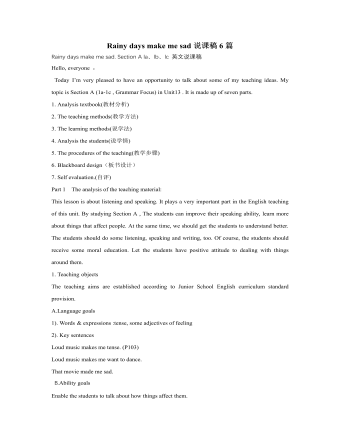
人教版新目标初中英语九年级下册Rainy days make me sad说课稿6篇
Today I’m very pleased to have an opportunity to talk about some of my teaching ideas. My topic is Section A (1a-1c , Grammar Focus) in Unit13 . It is made up of seven parts.1. Analysis textbook(教材分析)2. The teaching methods(教学方法)3. The learning methods(说学法)4. Analysis the students(说学情)5. The procedures of the teaching(教学步骤)6. Blackboard design(板书设计)7. Self evaluation.(自评)Part 1 The analysis of the teaching material:This lesson is about listening and speaking. It plays a very important part in the English teaching of this unit. By studying Section A , The students can improve their speaking ability, learn more about things that affect people. At the same time, we should get the students to understand better. The students should do some listening, speaking and writing, too. Of course, the students should receive some moral education. Let the students have positive attitude to dealing with things around them.1. Teaching objectsThe teaching aims are established according to Junior School English curriculum standard provision.A.Language goals 1). Words & expressions :tense, some adjectives of feeling 2). Key sentences Loud music makes me tense. (P103)Loud music makes me want to dance.That movie made me sad.B.Ability goals Enable the students to talk about how things affect them.Emotion & attitude goals Enable the students to understand the effect of things upon them.
- 下载

人教版新目标初中英语九年级下册Could you please tell me where the restrooms are教案
Step Ⅰ RevisionCheck homework. Ask a few students to read the article in 3a.Then ask a few students to read their guides.Step Ⅱ Part 1Look at the words in the box. Ask a student to read them. Make sure the students understand the meaning of the words. You are to fill in the blanks with the words. In some cases, students may need to use another form of the word, for example adjusting for tense or subject/ verb agreement.Ask students to fill in the blanks on their own.Check the answers. Step ⅢPart 2Go through the instructions with the class.Look at the example with the students.Ask students what the answer would be.Ask a student to read the question and answer it.Excuse me, could you tell me where the bank is, please?The bank is across the street from the shopping malt.Get students to complete the work in pairs.Check the answers. Ask a few students to read their questions.Step Ⅳ Just for Fun!Ask all the students to read the conversation. Ask: What is funny about this cartoon? Help students to explain. A Martian is a person from the planet Mars.There is no such thing as Martian food on Earth, and the clerk looks silly because he is trying to think of where there is a Martian restaurant.Invite some pairs of students to present this conversation to the rest of the class.Step Ⅴ Summary and HomeworkIn this class, we’ve done much writing practice using the key vocabulary words and the target language presented in this unit. After class, please finish the questions in 2 in your exercise books. Then finish the exercises on pages 47~48 of the workbook as well.The Seventh Period Ⅰ Teaching Aims and Demands1. Knowledge Objects(1) Key Vocabularyimage, adventure, jealousy, hero, crime, journey, brave, no longer, show interest in, take it easy, become interested in, plain looks(2)Text:Grown-ups like cartoons, too.2. Ability Objects(1) Fast-reading to get a general idea of the text.(2) Careful-reading to get the detailed information in the text.
- 下载
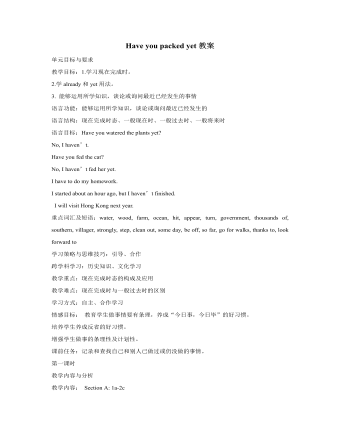
人教版新目标初中英语九年级下册Have you packed yet教案
教学目标:1.学习现在完成时。2.学already和yet用法。3. 能够运用所学知识,谈论或询问最近已经发生的事情语言功能:能够运用所学知识,谈论或询问最近已经发生的语言结构:现在完成时态、一般现在时、一般过去时、一般将来时语言目标:Have you watered the plants yet?No, I haven’t.Have you fed the cat?No, I haven’t fed her yet.I have to do my homework. I started about an hour ago, but I haven’t finished. I will visit Hong Kong next year.重点词汇及短语:water, wood, farm, ocean, hit, appear, turn, government, thousands of, southern, villager, strongly, step, clean out, some day, be off, so far, go for walks, thanks to, look forward to学习策略与思维技巧:引导、合作跨学科学习:历史知识、文化学习教学重点:现在完成时态的构成及应用教学难点:现在完成时与一般过去时的区别 学习方式:自主、合作学习 情感目标: 教育学生做事情要有条理,养成“今日事,今日毕”的好习惯。培养学生养成反省的好习惯。增强学生做事的条理性及计划性。课前任务:记录和查找自己和别人已做过或仍没做的事情。
- 下载
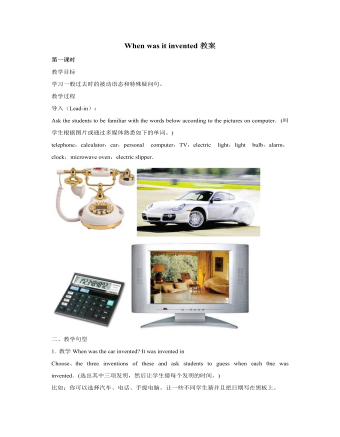
人教版新目标初中英语九年级下册When was it invented教案
二、教学 1a,1b.1.First the teacher asks the students what kind of fruit food and drink you like the best and writes down on the blackboard.教师问学生最喜欢什么水果和饮料并把它们写在黑板上。比如:potato chips,ice cream,tea,lemon,chocolate,oranges,salad,popcorn,pickle and so on.2.接着叫学生表达以上食物的味道,引出新单词——sweet,crispy,salty,sour,delicious,hot,awful,nice…并且完成lb教学内容通过此活动,以旧带新引入新单词。其目的是让学生自主学习新知识。 三、教学 2a,2b1.首先,听力前的brainstormFirst,Let students describe how potato chips taste and describe how helpful the potato chips.Then,ask:When and where were potato chips invented?Who were potato chips invented by?How were potato chips invented?(Let students guess according to the following key words.)Key words:by accident,customer,restaurant,by mistake.(说明:通过问题让学生对对话内容有整体了解,为听力练习做好准备;又培养学生的注意力,想像力,观察力。)
- 下载

人教版新目标初中英语九年级下册Could you please tell me where the restrooms are说课稿7篇
Period 3 (Section A part4, Section B 1a,1b, 3a-part4):通过前俩节的学习,学生对描述人物一天的活动有了全面的了解,本节课主要是让学生们对人们平常的活动从上午,下午,晚上三个时间段做出归类,(当然这并不是精确的,只是大概的)目的是为了让他们能够;了解并合理的安排时间Teaching aim:To ensure they can read the massage quickly and get the useful information;To ensure they can communicate about their daysTo know something about the morning schedule themselves and arrange their morning reasonably;To ensure they can write the composition about correctly.Teaching focus: say and write your morning and arrange their morning reasonablyPeriod 4 (self check)通过听说读写各个方面来检测学生是否已经基本掌握本单元的知识点,同时引导学生对自己的假日及学习时间做出比较合理的安排;同时了解时差;Teaching aim:To communicate about their daysTo ensure they can know more words; To ensure they can arrange their days reasonable;To know the culture of time; Teaching focus:words and useful expressionsTeaching procedure:Period 1 (1a-2c)Step 1 Say the time1. show the clocks and ask them:-What’s this in English?- What time is it?2. show the way how to express the time.Step 2 presentation1. show a clock ,ask them to say the time2. show the picture and let them to say what does he do ?if they cannot say ,let them say in Chinese.Show the English of the action :get up ,3. ask him :what time do you usually get up ?to the class :what time does he get up?To show the sentences and read.
- 下载

人教版新目标初中英语九年级下册By the time I got outside, the bus had already left教案
Ⅰ. Teaching Aims and Demands1. Knowledge Objects(1) Key Vocabularyoversleep(2) Target LanguageWhat happened?I overslept. And by the time I got up, my brother had already gotten in the shower.2. Ability Objects(1) Teach the students to use the new words.(2) Train the students to narrate past events with the Past Perfect Tense.(3) Train the students' listening and speaking skills with the target language.3. Moral ObjectIt’s a good habit to go to bed early in the evening and get up early in the morning. So you’ll never be in a hurry in the morning.Ⅱ. Teaching Key Points1. Key Vocabularyoversleep2. Target LanguageNarrate past events with the Past Perfect TenseⅢ. Teaching Difficult Points1. Train the students to narrate past events with the Past Perfect Tense.2. Train the students to understand the target language in spoken conversation.Ⅳ. Teaching Methods1. Thinking of examples from the students' real lives.2. Making sentences by looking at the pictures.Ⅴ. Teaching AidA tape recorderⅥ. Teaching ProceduresStep I Revision1. Revise the language points in Unit 8.Ask some questions like this: What volunteer work would you like to do?Help the students to answer, I’d like to…/I love to…/I hope to2. Practice the dialogue in Activity 3c on page 62 again. Get students to role play the similar dialogues with the following.
- 下载

人教版新目标初中英语九年级下册I’ll help clean up the city parks教案
Talk about offering help (P60)I’ll help clean up the city parks.A: I’d like to work ...B: You could help ...Talk about ways to tell people about the Clean-Up Day (P61)We need to ...We can’t ...I’ll ...Talk about the work the volunteers do (P62)These three students all volunteer their time to help other people.Somebody loves to ... / helps ... / plans to ... / wants to ...A: What do you like doing?B: I like ... A: What kind of volunteer work do you think I could do?B: You could ...1. 重点词汇advertisement, fix, repair, pleasure, blind, deaf, shut, carry, specially, fetch2. 认读词汇hunger, homeless, cheer, clean-up, sign, establish, major, commitment, elementary, veterinarian, coach, similar, call-in, strategy, disabled, organization, unable, support, appreciate, donation, part of speech, pronoun, adverb, preposition, conjunction, donate, Jimmy, Sally3. 词组clean up, cheer up, give out, put off, set up, think up, take after, fix up, give away, put up, hand out, work out, at once
- 下载

人教版新目标初中英语九年级下册You’re supposed to shake hands教案
教学目标:1. 掌握本单元一些重点词汇的写法和用法。2. 学会自如谈论餐桌礼仪。Step 1 RevisionAsk some students to retell the customs at the table in France in the passage in 3a.Step 2 Self checkPart 1. Fill in each bland with the correct word given. Students do the exercises by themselves at first. Then check the answers. Ask the students to comprehend the sentences and help them point out uses of some words, like “arrive (at / in) sw., spend time / money on sth , spend time / money (in) doing sth.”Part 2. Read about Fan Ling’s experience in a western restaurant. Understand the passage. Point out some key points in the passage.1. be / get used to doing sth. 习惯做某事2. begin with = start with 以….开头3. crowd v. 挤满,塞满 the crowd 人群 crowded adj. 拥挤的Then students discuss about how she would solve her problem. Ask some to share their stories with others.Part 3. Complete the crossword by looking at the sentences on the left. Then check the answers.
- 下载

人教版新目标初中英语九年级下册We’re trying to save the manatees教案2篇
本单元主要围绕着有关濒临灭绝的动物这一话题,学习了应该怎样保护我们的环境,以及就某一问题展开辩论。目标提示语言目标能够运用所学知识,就某一问题展开辩论。认知目标1、复习一些语法:现在进行时、一般现在时、用used to 表示一般过去时、现在完成时、一般过去时的被动语态。2、学会表达同意和不同意。3、学会以下基本句型:We’re trying to save the manatees.Manatees eat about 100 pounds of food a day.There used to be a lot of manatees.In 1972,it was discovered that they were endangered.Some of the swamps have become polluted.情感目标了解一些濒临灭绝的动物的生活习性和濒临灭绝的原因,教育学生应该如何保护环境。教学提示充分利用多媒体等教学设备,创设与本课话题相关的情境,如各种不同种类的动物、动物园以及有关环境的画画等等。围绕着本单元的教学目标,设计一些贴近学生实际的教学任务,如让学生谈论自己最喜欢的动物,如何拯救濒危动物,如何保护环境等等。让学生根据所学知识,就动物园是否对动物有利以及其他的话题进行辩论。
- 下载
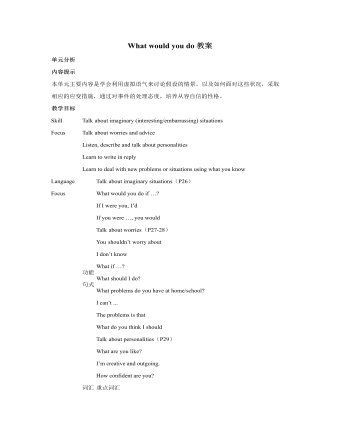
人教版新目标初中英语九年级上册What would you do教案
本课采用任务型教学法,用What would you do if you had a million dollars?这个问句,引出谈论假想情况的话题。 采用提问、启发和归纳的教法,让学生易于接受教材内容,培养学生的语言运用能力。 四、 教学过程设计 Step Ⅰ. Greet the whole class as usual. Step Ⅱ. Warming-up T: Do you have ten Yuan in your pocket? S1: No, I don’t. T: (Take out ten Yuan and give it to the student) OK, never mind. What would you do if it was yours? What would you do if you had ten Yuan? S1: I would buy snacks. T: OK, thank you. Sit down, please. (To the whole class) Just now, it was only ten Yuan. What about 100 Yuan? What would you doif you had 100 Yuan? S2: I’d buy a beautiful jacket. T: Thank you. (To the whole class) Now suppose you had a million dollars, what would you do? We know thatone dollar nearly equals eight Yuan, so that’s a large sum of money. Think it over carefully and tellme your ideas. What would you do if you had a million dollars? S3: I’d buy a big house. S4: I’d buy a sports car. S5: I’d put it in the bank. T: OK, stop here. Please look at the blackboard and guess what would I do if I had a million
- 下载
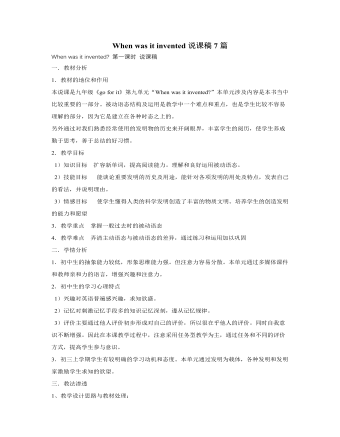
人教版新目标初中英语九年级下册When was it invented说课稿7篇
《新目标英语》中的具体语言目标是通过各种各样的Tasks来实现的;学生需要运用具体而特定的行动来完成一定的交际任务。整个教学过程中,各种语言结构与语言功能与不同的学习任务有机的结合。任务活动所谋求的效果不是一种机械的语言训练,而是侧重在执行任务中学生自我完成任务的能力和策略的培养;重视形式在完成任务过程中的参与和在交流活动中所获得的经验。因此本节课我将始终引导学生通过完成具体的任务活动来学习语言,让学生为了特定的学习目的去实施特定的语言行动,通过完成特定的交际任务来获得和积累相应的学习经验,让学生在用中学,在学中用。 2、教学原则 l 活动性原则 提倡学生主动参与,体验,交流,合作,探究等多种学习。 l 合作性原则 以学生为主体,师生合作,生生合作,体现教与学的互动,交往。 l 任务型原则 任务驱动—激发动机;任务完成—激励学习积极性;执行任务—培养责任 心和合作精神。 l 情感性原则 激发学生学习英语的兴趣和始终保持良好的学习情绪。
- 下载
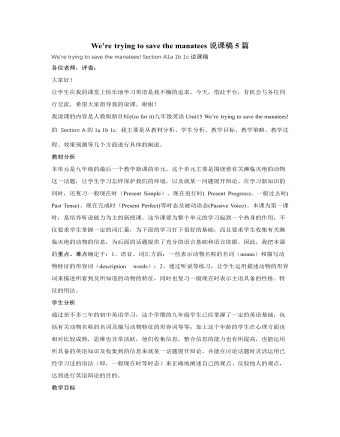
人教版新目标初中英语九年级下册We’re trying to save the manatees说课稿5篇
教材分析本单元是九年级的最后一个教学新课的单元。这个单元主要是围绕着有关濒临灭绝的动物这一话题,让学生学习怎样保护我们的环境,以及就某一问题展开辩论。在学习新知识的同时,还复习一般现在时(Present Simple)、现在进行时( Present Progress)、一般过去时( Past Tense)、现在完成时(Present Perfect)等时态及被动语态(Passive Voice)。本课为第一课时,是培养听说能力为主的新授课。这节课要为整个单元的学习起到一个热身的作用,不仅要求学生掌握一定的词汇量,为下面的学习打下很好的基础,而且要求学生收集有关濒临灭绝的动物的信息,为后面的话题提供了充分的语言基础和语言依据。因此,我把本课的重点、难点确定于:1、语音、词汇方面:一些表示动物名称的名词(nouns)和描写动物特征的形容词(description words);2、通过听说等练习,让学生运用描述动物的形容词来描述所看到及所知道的动物的特征,同时也复习一般现在时表示主语具备的性格、特征的用法。
- 下载
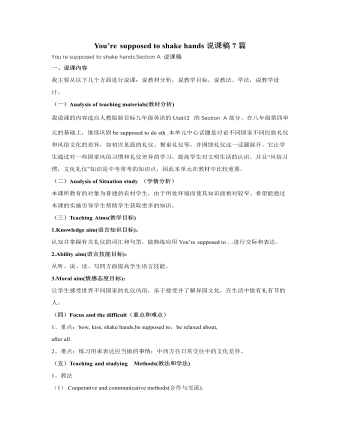
人教版新目标初中英语九年级下册You’re supposed to shake hands说课稿7篇
二 、教材分析本单元主要是通过对一些国家的风俗习惯、礼仪差异、时间观念和饮食文化的学习,进一步提高学生对文明生活的认识;加深学生对中外文化的了解,拓展学生的文化视野,为学生阅读相关方面的文章奠定一定的文化基础。我们知道近几年来有关风俗文化,生活习惯的 阅读内容一直是中考热门的话题之一。通过本单元的学习,学生可以掌握一定的相关方面的知识,为今后在阅读积累必要的信息。在Section A 当中出现的 be supposed to 句型为重点句型,此句型的语法结构为被动语态。被动语态也是历年来中考基础命题必考的内容之一。比如,去年的中考试题,在基础选择部分试题中就出现了对此语法结构考查。Section A 首先通过一些图片和句型来让学生初步了解本单元的语言目标。然后,通过练习进一步加以巩固。接着通过一组听力练习,来训练学生的听力,同时,学生可以具体了解到不同的国家在风俗习惯等方面有着怎样的不同。为下面的学习进行铺垫,同时激发学生了解更多的相关知识的学习兴趣。
- 下载

人教版新目标初中英语九年级下册By the time I got outside, the bus had already left说课稿5篇
本节课的内容是新目标九年级的复习课,根据我们现在上课的进度和内容,分为两部分,一部分是课本知识的处理,一部分是中考试卷的处理。备课时,我就思考把平时的课堂呈现出来,让大家提建议帮我完善一下初三复习课的上法。因为我对现在的课堂也感到十分的迷茫。这节课完成了预定的目标,我觉得比较满意的有:第一,调动了学生参与学习的积极性,引导学生成为课堂的主人, 他们有感而发,有感而说。第二,学生小组合作学习比较成功,在学习过程中,老师并没有参与,而把主动权会交给学生,让他们自己去讨论,自己去讲题,充分相信他们,肯定他们。学生的展示可谓精彩纷呈, 达到了预期效果第三,体现新课程的理念。学生主动,师生互动,思维灵动。其中,学生主动是根本,不仅要让学生唱主角,而且要让其主动地参与课堂学习的各个环节;不仅要让学生主动觅食,更要让其学会自种庄稼。
- 下载
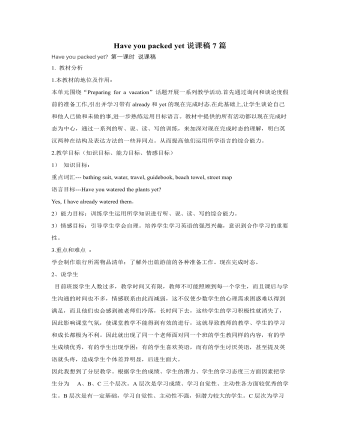
人教版新目标初中英语九年级下册Have you packed yet说课稿7篇
二 说学情 “以学生的发展为本”的新课程理念,要求教学必须以学生的学习基础、学生需要、学习兴趣等为出发点,联系学生的现代校内外生活,让课堂教学成为学生生命成长和个性张扬的过程。要实现以“学生为本”的理念,教学中必须要做到充分地预设学情。初三学生已经具备了一定的语言基础及语言表达能力,大部分学生对英语还有着比较浓厚的兴趣。同时,在长期的新课程理念熏陶及实践中,已经初步具备了自主,合作,探究的能力。本课教学内容与学生的实际生活密切相关,易于引发学生运用简单的英语进行交际和交流。通过八年级下册第九单元“Have you ever been to an amusement park?”的学习,学生已初步了解现在完成时的基本特征和结构,也比较熟悉“has/have been to…”的句型,这非常有利于本单元教学活动的开展。在此基础上,本单元以“Preparing for a vacation”和“Favorite band”等贴近学生实际生活的内容为话题,继续学习带有already与yet的现在完成时态,较快地激发学生的学习积极性,达成本单元的教学目标。
- 下载
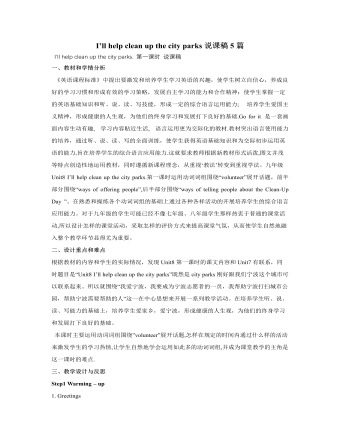
人教版新目标初中英语九年级下册I’ll help clean up the city parks说课稿5篇
二、教法学法1、任务型教学法:每个教学环节都是围绕着如何完成一个教学任务来设计的。2、感悟法:创设语境,让学生在一定的语言环境中感悟语言内涵,从而实现悟中学的目的。只有学生自己悟出的东西才能较好地内化为自己的东西。3、合作点拨法:通过教师创设的学习氛围,设置问题和反思质疑,推动师生,生生间的合作探究,小组合作学习,在解决问题中完成教学目标。以培养他们的合作探究的意识与精神。三、教学程序1 导入新课利用课件中的图片导入:在大屏幕上出示汶川大地震中一些悲惨的图片,让同学们说出汶川,然后老师说as well-know a stong earthquake happened in wenchuan,so many kind people go there to help others.再出示一些军人,医疗工作者,志愿者忙碌的身影,特别是温家宝总理看望受伤的孩子,让同学们知道一方有难,四方支持,帮助困难中的人是很有意义的。然后说Would you like to help others?What would you like to do?
- 下载
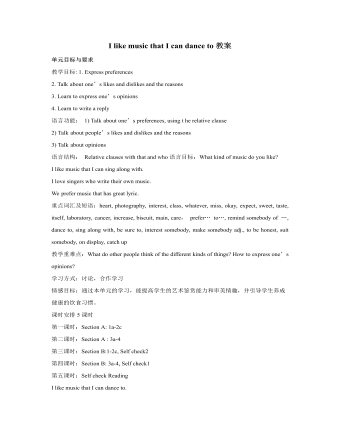
人教版新目标初中英语九年级上册I like music that I can dance to教案
教学目标: 1. Express preferences2. Talk about one’s likes and dislikes and the reasons3. Learn to express one’s opinions 4. Learn to write a reply 语言功能: 1) Talk about one’s preferences, using t he relative clause2) Talk about people’s likes and dislikes and the reasons3) Talk about opinions语言结构: Relative clauses with that and who语言目标:What kind of music do you like?I like music that I can sing along with.I love singers who write their own music.We prefer music that has great lyric.重点词汇及短语:heart, photography, interest, class, whatever, miss, okay, expect, sweet, taste, itself, laboratory, cancer, increase, biscuit, main, care, prefer… to…, remind somebody of …, dance to, sing along with, be sure to, interest somebody, make somebody adj., to be honest, suit somebody, on display, catch up教学重难点:What do other people think of the different kinds of things? How to express one’s opinions? 学习方式:讨论,合作学习情感目标:通过本单元的学习,能提高学生的艺术鉴赏能力和审美情趣,并引导学生养成健康的饮食习惯。课时安排5课时第一课时:Section A: 1a-2c第二课时:Section A : 3a-4第三课时:Section B:1-2c, Self check2第四课时:Section B: 3a-4, Self check1第五课时:Self check ReadingI like music that I can dance to.
- 下载
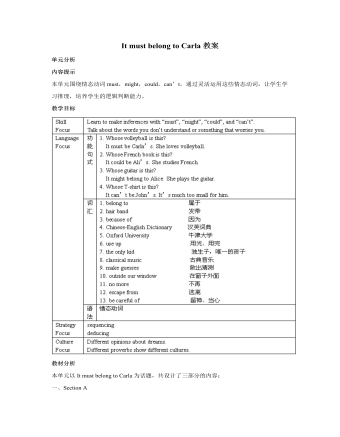
人教版新目标初中英语九年级上册It must belong to Carla教案
一、Section A该部分有4个模块。第一模块围绕Whose volleyball is this? 这一话题展开思维( 1a)、听力(1b)、口语( 1c)训练;第二模块围绕上一模块中的话题进行听力( 2a-2b)、口语训练( 2c);第三模块继续围绕前两个模块中的“making inferences”展开训练。训练形式为阅读排序( 3a)和两人问答(3b);第四模块仍就上一话题展开讨论。二、Section B该部分有4个模块。第一模块要求根据图画和所提供的单词写出合理的句子;第二模块在听力( 2a-2b)和分角色口语训练( 2c)的基础上,继续进行“推测”训练; 第三模块围绕“Strange events in Bell Tower neighborhood”这一话题展开阅读( 3a)和写作(3b -3c)训练;第四模块以dream为话题展开小组活动。三、Self Check该部分有3个模块。第一模块以填空形式对所学词汇进行训练;第二模块就8个谚语展开阅读和讨论。
- 下载

人教版新目标初中英语九年级上册Teenagers should be allowed to choose their own clothes教案2篇
Step 1 Greeting Greet the class and check the homeworkStep 2 A duty report The S on duty gives a report on the rules in his home and lead in 3a “Sun Fei’s and Wu Yu’s rules” Step 3 ReadingSs read the conversation and write the two girls’ rules in the chart. Check the answers.Get Ss to read after the tape and then read aloud by themselves. Then, T explains the language points.Step 4 Pairwork 3bRole play. Use the information in chart to practice with the conversation in 3a covered. They can look at the sample conversation in the right box.Step 5 Task 2 “Who’s the best reporter?”Make a survey by asking any 5 students the questions in the chart in activity 4. Then give out a report about it. See who is the best reporter? And the best reporter will get a nice ball-pen.Step 6 Summary and homework:Write out the report in your exercise-books.Period ThreeStep 1 Greeting and a duty reportThe S gives a duty report talking about his experience of being late for school. Lead in the question “Do you ever get to school late? How often do you get to school late? Always, usually, sometimes, or never?Step 2 1a Get Ss to finish writing.Step 3 Pairwork 1b Get Ss to talk about their answers with their partners using the sample conversation in the box on the right.Step 4 Listening practice2a Lead-in: What will happen if you get to school late? What about Peter? Let’s listen to a conversation between Peter and his father. Get Ss to finish 2a (As usual, for the first time, Ss only listen.) Check the answers.
- 下载